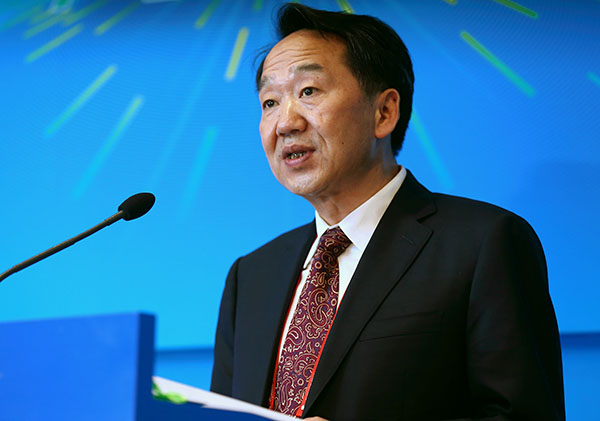Full text of Jiang Jianguo's speech at the 'Innovation and Development' International Seminar
 |
|
Jiang Jianguo, Minister of State Council Information Office of People's Republic of China. [Photo/China Daily] |
Jan 11, 2017, Geneva, Switzerland
Jiang Jianguo, Minister of State Council Information Office of People's Republic of China
Distinguished guests:
As you all know, Chinese President Xi Jinping will pay a state visit to Switzerland, attend the World Economic Forum, and call on the United Nations headquarters in Geneva, as well as the headquarters of the World Health Organization and the International Olympic Committee.
It is also known that it is nine years since the global financial crisis broke out. Along with the rise of populism, protectionism and parochialism, the world has come to a historical crossroads and must make the choice between war and peace, poverty and development, confrontation and cooperation, monopoly and win-win solutions.
And it is known to all that President Xi Jinping's visit is for peaceful development, win-win cooperation, economic globalization, and the establishing of a community of shared destiny for humankind.
History and realities show that a good global economic order cannot exist without good state economic governance. Currently, strengthening the sustainability and inclusiveness of the global economy entails all countries taking proactive action to manage their own business well, step up their policy coordination, seek the greatest common denominator, and form the largest concentric circle, so as to contribute to the stabilization and improvement of global economic governance. How has China done in these regards? That is the main content of my talk with you today.
First, China's economy has entered a new normal. Its economic growth has slowed, but it still remains stable and progressive.
With China's growing economic size and the deepening of China's cooperation with the world, the Chinese economy's development trend is of great significance to the outside world. China's economy has entered a new normal, a shift-changing period of slower acceleration due to restructuring and a change in its driving forces. On the one hand, the potential growth rate has decreased, leading to a drop in the realized annual economic growth rate, from 7.9 percent in 2012 to 6.7 percent in the first three quarters of 2016. However, the slowing growth has itself slowed and the trend is now clear: It is evident that the economy has become healthier and progressive and the growth rate is stabilizing.
This trend is collectively reflected in the improvement in people's livelihoods. The consumption rate of mainland residents has increased markedly, from 35.9 percent in 2010 to 38.5 percent in 2015, up 0.52 percentage points each year on average. The number of new jobs created from January to November last year hit 12.49 million, fulfilling 124.9 percent of the annual target in advance. The actual growth in average disposable income per capita was 6.3 percent in the first three quarters of 2016. The growth rate for people's wages, net income and net property income were all around 8 percent, and the growth of per capita net income transfer was 10.3 percent in the first three quarters of 2016. While targeted poverty alleviation efforts have lifted more than 10 million people out of poverty since they were firstly implemented nationwide one year ago. The integrating of the rural and urban medical insurance systems has also accelerated, and the quality of public medical services and the system's fairness has improved remarkably.
The trend has also been reflected in the continuous optimizing of the country's economic structure. In the first three quarters of 2016, the growth of the service sector's contribution ratio to the growth of the national economy reached 58.5 percent, and it became the main engine of economic growth, while consumption's contribution ratio to GDP growth hit 71 percent, the driver effects become stronger. The investment in high-tech industry increased 15.9 percent from January to November year-on-year, 7.6 percentage points more than the total investment growth rate.
The growth in profits made by equipment manufacturers and high-tech manufacturers has also accelerated, and more iron and steel and coal production is being eliminated than has been set as the targets. The asset-liability ratio in the industrial enterprises has dropped 0.6 percentage points year-on-year.
The trend is also collectively reflected in the effective strengthening of innovation's driving effects. China invested 2.07 percent of its GDP in research and development in 2015, the second highest amount in the world, while its number of patent application exceeded 1 million, the most in the world.
The speed of growth of strategic emerging industries and high-tech industries was more than 10 percent in the first three quarters of last year. The new economy, which consists of new industries, new technologies, new commercial activities, new products and new models, is thriving thanks to the deep integration between industry and the internet promoted by the leadership, and it has strengthened the driving force for the restructuring of the country's manufacturing industries.
Although China's economic growth has slowed, the Chinese economy remains one of the fastest growing economies in the world, and a booster for global growth. China's contribution ratio to the world economic growth was almost 40 percent last year, making China a main engine for the global economy. The world's second largest economy, China's economy is also stable and progressive, ensuring it can act as ballast for the sustainability of the global economy. The quality and efficiency of the Chinese economic development has improved, and the Chinese economy will release more market demand, more investment and provide more diversified products and create more valuable cooperation opportunities for the global economy.
Second, new development concepts constantly create new situations for development, and China is contributing new wisdom to global economic development
Chinese President Xi Jinping has made the scientific judgment that the Chinese economy has entered a new normal. On this basis, President Xi has proposed Five Development Concepts, namely innovation, coordination, green, opening-up and sharing, under the guidance of which, the Chinese government has drawn up its 13th Five-Year Plan (2016-20).
Innovation is the No. 1 driving force for boosting development, and Xi's new development concepts put innovation in a core position in the overall development situation. It means China will constantly improve its innovation capabilities, so as to form a sustainable impetus for long-term economic growth.
Coordination is the intrinsic requirement for healthy development, and it attaches greater importance to fair development opportunities, the balanced allocation of resources, and the prevention and control of various kinds of social conflicts and risks.
Green is the prerequisite for sustainable development and reflects people's pursuit of a better life. China adheres to the basic policies of saving resources and protecting the environment. China adheres to sustainable development, and is pushing forward the construction of a beautiful country, so as to make new contributions to global ecological safety.
Opening-up is the only path that leads to prosperity and development which is in line with the trend of China's integrating into world economy. It means China will actively take part in global economic governance and provide public products, strive to construct a broad community of shared interests, and take the initiative to use, expand and lead economic globalization.
Sharing is a reflection of people-centered development, which insists that development should be for the people, rely on the people and benefit the people. This applies not just to Chinese people but to people around the world, so they feel they are gaining from the process of development, and heading in the direction of a better life.
My friends, theory is grey, but the tree of life is evergreen. China began the all-round deepening of reforms in 2013, proposing 336 reforms in 60 fields. Last year, the central authority finished 97 key reforms, and government departments finished 194 reforms, 419 reform plans were issued, among which deepening supply-side structural reform has become a key feature so as to adapt to and lead the development of the economy in the new normal. The main direction is to improve the quality of goods, and to perfect the institutions and system so the market plays a decisive role in allocating resources, strengthens motivation, encourages innovation, improves labor productivity, and increases total factor productivity. The final purpose is to meet people's growing material and cultural demands.
The five main tasks of supply-side structural reform last year were decreasing capacity, decreasing inventory, deleveraging, reducing costs, and making up for the short slab.
This year, China will insist on seeking progress in stability, the main theme of economic work, and the key tasks of the supply-side structural reform are being expanded. It will deepen agricultural supply-side reform, promote the development of the real economy and the healthy development of the housing market, and properly handle potential risks in finance, government debt, the real estate industry and real economy. We have the confidence, capacity and actions to realize an economic development that is of higher quality, more efficient, fairer and more sustainable.
As a developing country with more than 1.3 billion people, that China is focused on doing its own tasks well and realizing the country's development and stability is itself a huge contribution to the world economy. The Five Development Concepts proposed by President Xi not only point out the direction for the sustainable development of the Chinese economy, but also contribute China's plans and wisdom to the reform, development and stability of the global economy.
Third, actively push forward global governance innovation, and lead the new development of economic globalization
The low-speed growth in global trade calls for all countries to continue to coordinate and cooperate, promote fairness and justice, guard against trade protectionism, and foster economic globalization to become more vigorous, inclusive and sustainable.
In terms of trade policies, countries should promote innovation and the development of digital economy through strengthening the establishment of new rules in e-commerce, etc, constructing an inclusive global value chain, encourage medium and small-sized enterprises, and least developed countries to integrate into the global value chain, and eliminate poverty, so as to realize the United Nations 2030 sustainable development goals.
China is a firm supporter of the multilateral trading system. It strictly abides by the WTO rules, has fulfilled all its promises and obligations, and actively taken part in and pushed forward multilateral trade negotiations, since it entered the organization in 2001. China will continue to play a leading role as a responsible big trading country, and make positive contribution to push forward the progress of the WTO, defend the multilateral trading system, and foster global trade and investment liberalization and facilitation.
To establish a new type of open world economy, the international community needs to innovate the global governance structure. China established a trade and investment working group for the first time for the G20 Summit held in Hangzhou, Zhejiang province, last year, and drew up the G20 Global Trade Growth Strategy and G20 Global Investment Guiding Principle. The WTO and the other international organizations provided powerful support for the success of the G20 Summit in Hangzhou and the making of relevant policies, and conferences for the B20 meeting of business leaders and the T20 meeting of think tanks were held in the WTO's headquarters in May and June last year. However, it now requires the efforts of all parties to implement the fruits of the G20 Summit in Hangzhou.
Fourth, strengthen innovation cooperation, and seek a the community of shared destiny for all humankind.
History indicates innovation has always been an important power pushing forward the development of human societies. Currently, a new technology revolution and industrial revolution are underway, which are bringing both opportunities and challenges to global economic growth, international trade and investment, the global value chain, the industrial structure, as well as the global division of labor, labor forces and social security. Economies have to adapt to fast changing situations and grasp the opportunities, strengthen cooperation in technology, finance, standardization, the business environment, cyberspace security and a new type of infrastructure construction, so as to share the fruits of technological progress and industrial development. It takes courage and responsibility to face up to challenges. All economies should actively provide necessary public services for medium, small-sized and micro enterprises, medium and low-level workers and vulnerable groups, and make joint efforts to build a richer, fairer, more inclusive and civilized community of shared destiny for all humankind.
To implement its innovation-driven development strategy, China adheres to the two-wheels of innovation and technological innovation and institutional innovation and it has rolled out a series of reform measures. In 2016 , China established a fair competition review system, innovated the government's model for the allocation of resources, stepped up protection of private property rights and intellectual property rights, established a batch of model State-level innovation zones, technology innovation centers and model bases for startups and innovations, and continuously promoted the construction of efficient innovation systems.
Switzerland's innovation ability is second to none in the world. China and the Switzerland have comparatively strong complementarity in carrying out innovation cooperation. It is of great significance that the Chinese Academy of Social Sciences and International Trade and Sustainable Development Center co-host the "Innovation and Development" International Seminar today, as think tank scholars are expected to achieve productive research fruits through high-level dialogues.
Finally, I sincerely wish the success of the seminar.
Thank you all.

























